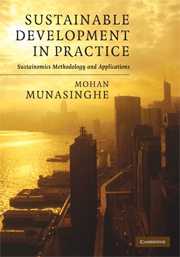Book contents
- Frontmatter
- Contents
- Foreword by James Gustave Speth
- Preface
- Part I Framework and fundamentals
- Part II Global and transnational applications
- 5 Global analytical applications
- 6 International process applications: multilevel, multistakeholder, transdisciplinary dialogues
- Part III National and macroeconomic applications
- Part IV Sub-national sectoral and system applications
- Part V Project and local applications
- References
- Index
6 - International process applications: multilevel, multistakeholder, transdisciplinary dialogues
Published online by Cambridge University Press: 05 August 2012
- Frontmatter
- Contents
- Foreword by James Gustave Speth
- Preface
- Part I Framework and fundamentals
- Part II Global and transnational applications
- 5 Global analytical applications
- 6 International process applications: multilevel, multistakeholder, transdisciplinary dialogues
- Part III National and macroeconomic applications
- Part IV Sub-national sectoral and system applications
- Part V Project and local applications
- References
- Index
Summary
The case studies in this chapter focus on participatory-consultative processes relating to the social dimension of sustainable development. They describe a variety of global multilevel, multistakeholder, transdisciplinary dialogues that are crucial for making development more sustainable (see Sections 1.2.4 and 2.1.3). Within the conventional categories of government, business and civil society, epistemic communities of experts and practitioners could play a key catalytic role in cross-linking and stimulating pluralistic participation (Munasinghe, 2001b, 2004c; Sneddon, Howarth and Norgaard, 2006). The involvement of young people is also important (Focus the Nation, 2007). Section 6.1 describes how climate change and sustainable development (see Chapter 5) are handled in the Intergovernmental Panel on Climate Change (IPCC) writing process. The case study examines how this unique international dialogue among thousands of scientists is transcending barriers of discipline, space, time, stakeholder viewpoints and operationality, in addressing complex, interlinked, large-scale, long-run issues. In the second case study, Sections 6.2 and 6.3 explore two-way linkages between two other complex global initiatives – the millennium development goals (MDGs) and millennium ecosystem assessment (MA) findings. The Action Impact Matrix (AIM), a key sustainomics tool, is used to explore linkages between the two at both national and global levels. Finally, in Sections 6.4 to 6.6, we examine how a uniquely successful multistakeholder, multilevel process has been organized by the UNEP Dams and Development Programme (DDP), as a follow-up to the World Commission on Dams (WCD). It deals with key water resource issues at the international, regional and national levels (see Chapter 12).
- Type
- Chapter
- Information
- Sustainable Development in PracticeSustainomics Methodology and Applications, pp. 180 - 208Publisher: Cambridge University PressPrint publication year: 2009



